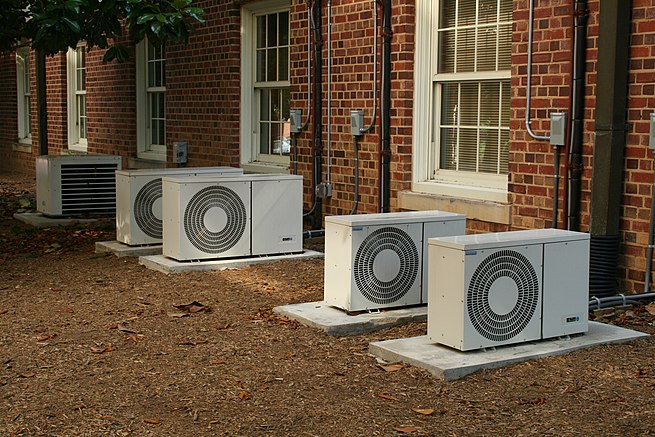
Main Difference
The main difference between Air Conditioning and Refrigeration is that the Air Conditioning is a process of altering the properties of air to more favourable conditions and Refrigeration is a process of moving heat from one location to another in controlled conditions
-
Air Conditioning
Air conditioning (often referred to as AC, A/C, or air con) is the process of removing heat and moisture from the interior of an occupied space to improve the comfort of occupants. Air conditioning can be used in both domestic and commercial environments. This process is most commonly used to achieve a more comfortable interior environment, typically for humans and other animals; however, air conditioning is also used to cool and dehumidify rooms filled with heat-producing electronic devices, such as computer servers, power amplifiers, and to display and store some delicate products, such as artwork.
Air conditioners often use a fan to distribute the conditioned air to an enclosed space such as a building or a car to improve thermal comfort and indoor air quality. Electric refrigerant-based AC units range from small units that can cool a small bedroom, which can be carried by a single adult, to massive units installed on the roof of office towers that can cool an entire building. The cooling is typically achieved through a refrigeration cycle, but sometimes evaporation or free cooling is used. Air conditioning systems can also be made based on desiccants (chemicals which remove moisture from the air). Some AC systems reject or store heat in subterranean pipes.In construction, a complete system of heating, ventilation, and air conditioning is referred to as HVAC. As of 2018, 1.5 billion air conditioning units were installed, with the International Energy Agency expecting 5.6 billion units in use by 2050. Globally, current air conditioning accounts for 1/5 of energy usage in buildings globally, and the expected growth of the usage of air conditioning, will drive significant energy demand growth. In response to, in 2018 the United Nations called for the technology to be made more sustainable to mitigate climate change.
-
Refrigeration
Refrigeration is a process that removes heat from a space, substance, or system to lower and/or maintain its temperature below the ambient temperature. In other words, refrigeration is artificial (human-made) cooling. Energy in the form of heat is removed from a low-temperature reservoir and transferred to a high-temperature reservoir. The work of energy transfer is traditionally driven by mechanical means, but can also be driven by heat, magnetism, electricity, laser, or other means. Refrigeration has many applications, including household refrigerators, industrial freezers, cryogenics, and air conditioning. Heat pumps may use the heat output of the refrigeration process, and also may be designed to be reversible, but are otherwise similar to air conditioning units.
Refrigeration has had a large impact on industry, lifestyle, agriculture, and settlement patterns. The idea of preserving food dates back to at least the ancient Roman and Chinese empires. However, mechanical refrigeration technology has rapidly evolved in the last century, from ice harvesting to temperature-controlled rail cars. The introduction of refrigerated rail cars contributed to the westward expansion of the United States, allowing settlement in areas that were not on main transport channels such as rivers, harbors, or valley trails. Settlements were also developing in infertile parts of the country, filled with newly discovered natural resources.
These new settlement patterns sparked the building of large cities which are able to thrive in areas that were otherwise thought to be inhospitable, such as Houston, Texas, and Las Vegas, Nevada. In most developed countries, cities are heavily dependent upon refrigeration in supermarkets in order to obtain their food for daily consumption. The increase in food sources has led to a larger concentration of agricultural sales coming from a smaller percentage of farms. Farms today have a much larger output per person in comparison to the late 1800s. This has resulted in new food sources available to entire populations, which has had a large impact on the nutrition of society.
As quite similar criteria shall be fulfilled by working fluids (refrigerants) applied to heat pumps, refrigeration, and organic Rankine cycles; several working fluids are applied by these technologies. Ammonia was one of the first refrigerants. Refrigeration can be defined as “The science of providing and maintaining temperature below that of surrounding atmosphere”. It is the continuous extraction of heat from a body.
-
Refrigeration (noun)
The process of transferring heat from an object in order to cool it.
-
Refrigeration (noun)
The process of preserving something by cooling.
-
Refrigeration (noun)
The cooling of the body for therapeutic purposes.
